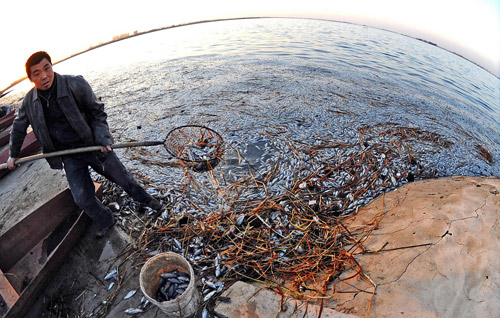Society
Thousands of dead fish found in contaminated reservoir
(China Daily)
Updated: 2010-04-08 08:16
 |
Large Medium Small |
SHENYANG - Dead fish have formed a 2-km-long, 2-meter-wide belt in a reservoir in Northeast China's Liaoning province when the water appeared badly contaminated, which may affect spring irrigation in the area.
"The water has turned dark and started stinking since the thick ice layer completely melted early this month. More and more dead fish have appeared, making the odor even stronger," said Hao Guixiang, one of the workers using nets to take the fish out of Tuanjie Reservoir in a suburb of Shenyang, capital of Liaoning.
The reservoir currently has about 28 million cubic meters of water with a depth of three meters and covers an area of more than 13 square km.
The reservoir's water quality has never been good as it sits at the lower reaches of the Puhe River, which is full of industrial and farming sewage. However, the reservoir has never been this badly polluted, experts said.
For a long time, the reservoir has been used for irrigation and flood control, "and this is the first time the situation has become so dreadful", said Hao.
The reservoir usually begins to release water in mid-May, providing about 2.2 million cubic meters of irrigation water, said Guo Zhanying, an officer with the reservoir management office.
"My cropland will suffer this year if the water problem is not solved quickly," said Tian Huifang, a paddy farmer in the area.
The priority is to first clear the reservoir, examine the fish and the water, and then disinfect the reservoir, said Wang Xiaodong, vice-director with the Liaoning provincial environment supervision administration.
Experts will work out water treatment plans based on the test results.
Officials of Shenyang municipal environment protection bureau are also on their way to the upper reaches of the Puhe River to find the source of the pollution.
Liaoyang county government has decided to seal up the reservoir's overflow gate to stop the polluted water from flowing onto farmland.
The reservoir, built in the 1970s, is owned by the water conservancy bureau of Liaozhong county in Shenyang. It has a water holding capacity of more than 40 million cubic meters.
Xinhua








